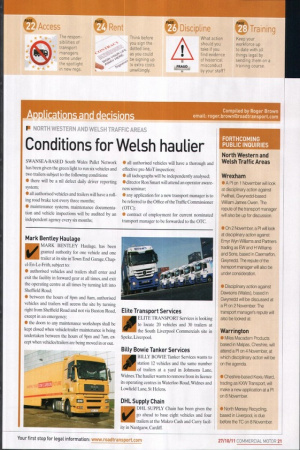Sins of the past
Page 21

If you've noticed an error in this article please click here to report it so we can fix it.
A driver has been on the fiddle, but you don’t find out until months later. What action can you take?
Words: Gareth Edwards and Charlotte Houston How should employers deal with a discovery of wrongdoing in the workplace that emerges some time after the incident? You might ind out, for example, that drivers have been siphoning off fuel for personal use or iddling their expenses, but the incidents happened many months ago.
When past misconduct becomes known, there is a danger that employers will ignore it and refuse to take any action. Maybe inaction follows from the dificulties of obtaining reliable evidence. New managers might not appreciate the effect the misconduct had and could think that investigating past matters might appear petty and unnecessary.
Employers should be aware that failure to take action over historical misconduct not only sends the wrong message to employees, but also runs the risk of scrutiny by an outside body – such as the taxman, for example.
• What procedure should be followed when dealing with historical misconduct?
Fair disciplinary procedures need to apply to any alleged incident of misconduct. These include a reasonable investigation, separation of roles throughout the different stages of the process and a right of appeal. When disciplinary proceedings investigate accusations of misconduct alleged to have occurred some time ago, additional issues must be taken into consideration. For instance: • Why have the allegations only come to light now? This could simply be down to evidence emerging that links an employee with a particular incident. Consideration should be given to the context of the time and whether the behaviour might not have historically merited disciplinary action. A inding of miscon duct may be elevated to gross misconduct if there is evidence of deliberate concealment.
• Was the employee’s manager previously aware of the alleged misconduct?
If so, it is important to investigate why disciplinary action was not taken sooner. If the employee’s misconduct was ignored or accepted by a senior employee, this might undermine any subsequent decision to dismiss or impose any other disciplinary sanction. Managers should receive training on how to deal with misconduct in the workplace. Emphasis should be placed on the importance of dealing with misconduct when it arises to ensure that any unacceptable behaviour is prevented from becoming common practice. • How can we investigate something that happened such a long time ago?
An employer must believe that the alleged misconduct took place for a dismissal to be considered fair. To support such belief, an employment tribunal will expect to see evidence of a reasonable investigation. What is reasonable will depend on the circumstances. If irst-hand witnesses are no longer employed or contactable, the employer may base its decision on hearsay evidence if it can be corroborated, sounds feasible and there appears to be no ulterior motive. If documents or other hard evidence are unavailable, then the employer may not be unreasonable in relying on personal recollections of the contents of such evidence.
• What if the alleged perpetrator has had a clean record since the alleged misconduct?
If the alleged perpetrator has risen through the ranks of your organisation, and has historically been held out as a positive role model, then it might be dificult for an employer to ind the motivation to accept that it may have misjudged the individual. However, you should not shy away from tackling their previous conduct or inding that this warrants a disciplinary sanction. Their positive contribution can be considered mitigation justifying a lower sanction than would normally be applied in cases of such misconduct.
Whistle blowing
Employees who witness misconduct in the workplace may fear reporting it. Concerns might include who to approach, whether their action will make any difference and whether they might experience retaliation from the workforce. Adopting and following an eficient whistle-blowing policy will provide employees with clear instructions on how to express any concerns they may have regarding misconduct in the workplace. A good policy will also provide the employee with information on to how their complaint will be dealt with and provide reassurance that all disclosures are taken seriously.
When it comes to dealing with
historical misconduct, prevention is better than cure. Dealing with misconduct as it occurs ensures that wrongdoing doesn’t become common practice. Such an approach can be aided by adopting a well-drafted whistle-blowing policy, ensuring managers are trained in how to spot and deal with misconduct and by having a comprehensive set of rules for employees to follow. ■














































